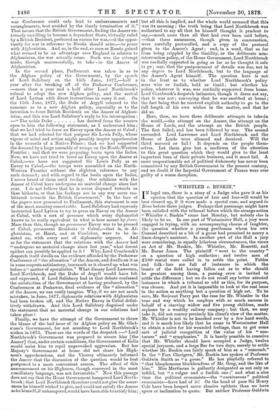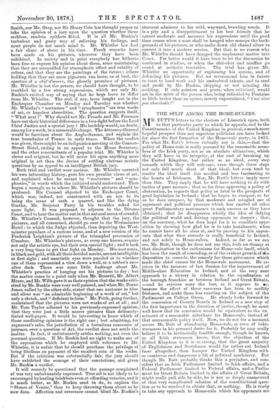" WHISTLER v. RUSKIN." Smith, nor Mr. Greg, nor Sir
Henry Cole has thought proper to take the opinion of a jury upon the question whether these reckless, random epithets fitted. It is all Mr. Ruskin's turbulent and gusty way of relieving his feelings, and most people do not much mind it. Mr. Whistler has had a fair share of abuse in his time. Frank remarks have been made on his pictures, wherever they have been exhibited. In society and in print everybody has hitherto been free to express his opinion about them, some maintaining that they are unequalled for atmospheric effect and subtilty of colour, and that they are the paintings of the future ; others holding that they are mere pigments run loose, or at best, the spectres of a chef dcettvre, the ghostly promises of pictures. Mr. Whistler is not the person, we should have thought, to be troubled by a few strong expressions, which are only Mr. Ruokin's excited way of saying that he begs leave to differ from Mr. Whistler. The real, if any, issue fought out in the Exchequer Chamber on Monday and Tuesday was whether Mr. Whistler's " nocturnes " and " symphonies" are true works of art, or hopeless absurdities. The question suggests itself, "What next ?" Why should not Mr. Fronde and Mr. Freeman have out their historical differences in a free-fight before the Lord Chief Justice and a special jury ? His lordship would, no doubt, sum up for a week, in a memorable charge. The Attorney-General would be facetious about the Anglo-Saxons' and explain the true boundaries of France in early times. When the verdict was given, there might be an indignation meeting at the Cannon- Street Hotel, ending in an appeal to the Home Secretary, and the other concomitants of a popular trial. Mr. Whistler is clever and original, but he will never hit upon anything more original in art than the device of settling abstruse artistic questions by an appeal to an intelligent British jury.
Both trial and verdict were curious. Mr. Whistler narrated his own interesting history, gave his own peculiar views of art, and explained what he meant by " nocturnes " and " sym- phonies," in words which the initiated could understand. Then began a wrangle as to where Mr. Whistler's pictures should be produced. His Counsel objected to the Exchequer Court, which was, indeed, not constructed with an eye to its being the scene of such a quarrel, and like the dying Goethe, Mr. Serjeant Parry in his troubles asked for more light. It was proposed to adjourn to the Divorce Court, and to hear the matter out in that natural arena of scandal.
Mr. Whistler's Counsel, however, thought that the jury, the pictures, and all concerned, should go over to the Westminster
Hotel ; to which the Judge objected, thus depriving the West- minster populace of a curious scene, and of a new version of Sir Frederick Leighton's picture of the triumphal procession of Cimabue. Mr. Whistler's pictures, as every one knows, require not only the artistic eye, but their own special light ; and it took a very long time to get that light on Monday. His nocturnes, in black and gold, with all their decided merits, are not intelligible at first sight ; and unartistic eyes were puzzled as to whether one of them represented a view down a well, or a robber's cave after dark. There was some little badinage about Mr. Whistler's practice of hanging out his pictures to dry ; but the matter came to a point only when Mr. Rossetti, Mr. Albert Moore, and Mr.Wills gaveit as their opinion thatthe works criti- cised by Mr. Ruskin were very well painted, and when Mr. Burne Jones, called by the other side, stated that one nocturne in blue and silver was." an admirable beginning of a work of art," but only a sketch, and " deficient in form." Mr. Frith, going further, maintained that the pictures were not works of art at all ; and Mr. Tom Taylor adhered to his previously-expressed opinion, that they were just a little nearer pictures than delicately- tinted wall-paper. It would be interesting to know which of these conflicting opinions is the right one ; but admitting, for argument's sake, the jurisdiction of a fortuitous concourse of jurymen over a question of Art, the verdict does not settle the matter. In fact, it unfortunately settles nothing, not even the personal question. If Mr. Ruskin had no right to make use of the expressions which he employed with reference to Mr. Whistler, it is unfair that he should purchase the privilege of being libellous on payment of the smallest coin of the realm. But if the criticism was substantially fair, the jury should have exhibited the courage of their convictions, and given Mr. Ruskia a verdict.
It will scarcely be questioned that the passage complained of was very unfortunately expressed. True art is not likely to be encouraged by hurling brickbats even at offending votaries, and it is much better, as Mr. Ruskin used to do, to explain the " Stones of Venice," than to keep throwing them about as he now does, Affection and reverence cannot blind Mr. Ruskin's
sincerest admirers to his wild, wayward, brawling words. It is a pity and a disappointment to his best friends that he cannot moderate and measure his expressions until the good time comes when a man shall be hanged who scamps the back- grounds of his pictures, or who melts down old chased silver to convert it into a modern service. But that is no reason why Mr. Whistler should have dragged the unpleasant matter into Court. Far better would it have been to let the discussion be continued in studios, or when the chit-chat and muffins go round at aesthetic tea-tables. The trial has given Mr. Whistler an opportunity of explaining his system, and of defending his pictures. But we recommend him in future to trust to hard work and his undoubted talents, and to read and profit by Mr. Ruskin, skipping or not minding the scolding. If only painters and poets, when criticised, would act in the spirit of the person who, being ridiculed by Fontaine as little better than an oyster, merely expostulated, " Ceci teat pas charitable!"



































 Previous page
Previous page